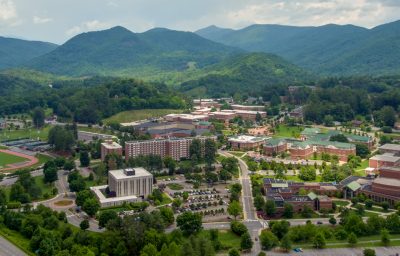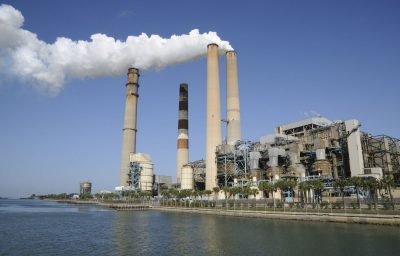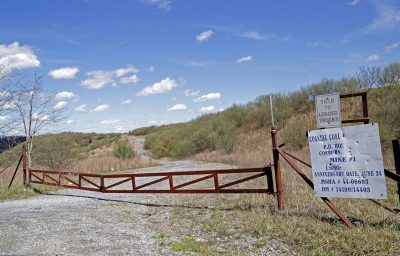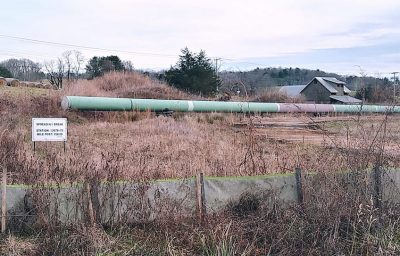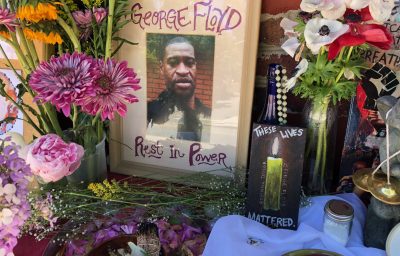

BLOGGER INDEX
The Appalachian Voice
Join App Voices at the Appalachian Studies Conference
Wednesday, February 21st, 2024 | Posted by The Appalachian Voice | No Comments
Remembering David Hairston
Thursday, July 27th, 2023 | Posted by The Appalachian Voice | 6 Comments
Monitoring air quality across Appalachia
Tuesday, November 22nd, 2022 | Posted by The Appalachian Voice | 3 Comments
Reckoning with land ownership as Central Appalachia moves away from coal
Tuesday, September 6th, 2022 | Posted by The Appalachian Voice | No Comments
The Mountain Valley Pipeline is far from inevitable
Thursday, March 17th, 2022 | Posted by The Appalachian Voice | 2 Comments
Black Lives Matter. We stand in solidarity.
Monday, June 8th, 2020 | Posted by The Appalachian Voice | No Comments
Coal miners visit D.C. to urge Congress to act on Black Lung legislation
Thursday, July 25th, 2019 | Posted by The Appalachian Voice | No Comments
EPA takes major step to end Mountaintop Removal Mining
Friday, April 2nd, 2010 | Posted by The Appalachian Voice | No Comments
 The EPA took a major new step towards ending the environmentally destructive practice of Mountaintop Removal Mining today.
The EPA took a major new step towards ending the environmentally destructive practice of Mountaintop Removal Mining today.
New guidance standards, effective today for new and pending surface mining permits in Appalachia, will mean that the practice of filling in valleys with mountaintops will probably not be permitted unless they meet a high standard, according to Environmental Protection Agency administrator Lisa Jackson.
“Either no or very few valley fills are going to meet standards like this,” Jackson said in a press conference today. “If we keep doing what we have been doing we’re going to see increasing degradation of water quality.”
The new EPA standard involves a general measure of water health called conductivity, or specifically, the ability of water to pass an electrical current.
Appalachian streams below MTR valley fills typically have a conductivity of 900 microSeimens per centimeter or more, according to Donna Lisenby, Waterkeeper for the Wautauga River.
The EPA standard sets conductivity below 500, with 300 to 500 in the suspect range, Jackson said. This is the first time a numeric standards have been used to measure stream health, she said.
“The intent here is to tell people what the science is telling us,” Jackson said. “It would be untrue to say that you can have numbers of valley fills, anything more than very minimal valley fills, and not expect to see irreversible damage to stream health. And that’s just the truth. That’s what we’ve learned, and the beauty of this is that it’s entirely based on what we believe the science is telling us.”
Existing operations will not be canceled, Jackson said, but 79 major surface mining permits now undergoing review would have to comply with the new standard.
Other scientific standards, such as selenium contamination, may also be a factor in future EPA consideration of permits for valley fills, but the advantage of the conductivity standard is that a test can be done on site and it can provide instant results.
Questioned about the somewhat technical issue of how closely such measurements would be taken, Jackson said the point of the tests is to measure how much contamination is entering a stream, and that would mean testing as close to the source as possible.
Environmental groups reacted with applause today, while mining companies threatened more job losses.
“Appalachia thanks Lisa Jackson and the EPA for taking the impacts on human health and environmental justice into consideration when issuing permits,” said Judy Bonds of Coal River Mountain Watch in West Virginia.
The National Mining Association objected, called the new standard “a sweeping regulatory action that affects not only all coal mining in the region, but also other activities.”
Anticipating the mining industry’s reaction, Jackson said:
“This is not about ending coal mining – this is about ending coal mining pollution.”
“The people of Appalachia shouldn’t have to choose between a clean, healthy environment in which to raise their families and the jobs they need to support them. “
Legislation to further curb MTR mining and protect Appalachian communities, the Clean Water Protection Act, is still needed, said Lenny Kohm with Appalachian Voices. The bills are pending in the US House and Senate.
For more on the EPA’s action today see:
Blankenship and Kennedy: Head-to-Head
Friday, January 22nd, 2010 | Posted by The Appalachian Voice | No Comments
By_Bill_Kovarik
An often pointed but unfailingly polite debate Thursday demonstrated a wide gulf between environmental and coal industry positions on Appalachia’s environmental woes.
Robert F. Kennedy Jr., president of the Waterkeeper Alliance, challenged coal baron Don Blankenship to be honest about the coal industry’s environmental record, especially mountaintop removal mining.

“This is the worst environmental crime that has ever happened in our history,” Kennedy said, advocating an end to MTR and a gradual shift to renewable energy sources. “We all have a moral obligation to stop this from happening.”
Blankenship, chairman of Massey Energy Company, said the issue was one of industry competitiveness in the face of “environmental extremism.”
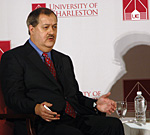
Blankenship also challenged Kennedy on the cost of renewable energy, asking why more was not being developed. “If windmills are the thing to do, it will happen naturally.”
Wind is cheaper than coal power, Kennedy responded. “I’m stunned that Mr Blankenship doesn’t know that this is going on.”
The debate, a Forum on the Future of Energy, was sponsored by the University of Charleston in Charleston, WV on Thursday evening, Jan. 21.
Although the debate developed little common ground, its civil tone contrasted with the rancor of hearings and other public events in recent years.
“Its sadly rare in our society to have a serious conversation between people with opposing opinions on a sensitive issue,” said debate moderator Edwin Welch, President of the University of Charleston WV.

At one point, Blankenship was asked if there were points of agreement between himself and Kennedy.
Blankenship: “We have some agreement on the fact that the world has to be part of the solution, not just the United States, and that we have to have a competitive industry if we are going to compete in a free world… Mr. Kennedy and Mr. Gore and all these other people who espouse this environmental stuff are basically mistaken as opposed to evil, because the bottom line is that if we don’t agree that homeland security, good use of our energy, low cost electricity for our houses, low cost gas for our industry, jobs, good households, high quality of life are the objective … If we don’t agree on that, then we are fundamentally on different pages.”
Kennedy said there were a few points of agreement. “I agree with a lot of Don’s rhetoric,” Kennedy said, “but I think there is a big gap between his rhetoric and what I see happening on the ground in these communities.” Kennedy also that they agreed on opposition to free trade and that “geological carbon sequestration is a joke.”
“That’s true,” Blankenship said, referring to carbon sequestration as a joke.
Kennedy and Blankenship sharply disputed topics such as: :
• Economic impacts and benefits of coal mining for Appalachia;
Kennedy: You look at the way people are living in this state. The Hendryx study shows that the closer you live to a coal mine, the sicker you are.”
Blankenship: This industry is what made this country great. If we forget that we’re going to have to learn to speak Chinese.
• Enforcement of environmental laws;
Kennedy: In a true free market system, the price of a product would reflect all of its costs. A producer like Mr Blankenship would have to pay all of the costs of his product before he gets it to market, instead of forcing you and I and my children to pay through bad health by externalizing those costs.
Blankenship: Unfortunately the laws are so difficult and the lawsuits so common and the cost of doing business is so high … To force the coal business out of West Virginia or surface mining would be a huge mistake for household budgets, for industry and for homeland security.
• Massey Energy company’s environmental record;
Kennedy: Just this last year, Massey had 12,900 (water quality) violations — A greater concentration than even before the $20 million fine (of 2008).
Blankenship: There is no country that mines coal more safely or more envirionmentally consciously than this country, and no company that does better at that than Massey.
• The cost and benefits of renewable energy;
Kennedy: The mining industry makes a few people rich by making everyone else poor, whereas the wind industry distributes wealth and the benefits of that industry more evenly.
Blankenship: Solar energy, it works well in the daytime, but it gets cold at night. Solar… and windmill parts will be made overseas…
Kennedy and Blankenship avoided a pitched debate over climate change, with Blankenship noting that he thought it was a “hoax” and Kennedy saying that the “science is settled.” However, Blankenship said there was a practical reason for his position on climate change. “If you look at 6.5 billion tons of coal in the world to raise their quality of life its not going to be possible to change the temperature of the earth by limiting the industry in this country and taking people’s jobs away.”
Kennedy also described the biodiversity being lost through Mountaintop Removal Mining:
Kennedy: During the Pleistocene ice age, 20,000 years ago, when there were 2 and a half miles of ice above the place where I live in NY, the rest of the country became a tundra, and all the trees disappeared except for one tiny refuge in the mountains of Kentucky and West Virginia. After the ice withdrew 12,000 years ago, all of North America was reseeded from those seed stocks. And that’s why the mountains of Appalachia are so important. They are the most biologically abundant temperate forests on the planet. A typical forest, all over the world, has three dominant species of trees. Appalachia has 80.
There were also moments of levity in the debate. At one point, Blankenship said he was glad Kennedy didn’t blame him for the ice age 20,000 years ago. And moderator Edwin Welch noted at the end of the debate that he didn’t think there would be a need for any “altar calls” for the converted.
In his summary statement, Kennedy said:
Kennedy: Don says we have to choose between environmental protection on the one hand and economic prosperity on the other. I say that’s a false choice… Good environmental policy is identical to good economic policy. We want to measure or economy … based upon on how it produces jobs, and the dignity of our jobs, over the generations, over the long term, and how it preserves the value of the assets of our community. If on the other hand we want to do what Don himself and his company have been urging us to do, which is to treat the planet as if it were a business in liquidation, convert all of our natural resources to cash as quickly as possible, have a few years of pollution based prosperity, we can generate an instantaneous cash flow and the illusion of a prosperous economy, but our children are going to pay for our joy ride, and they are going to pay for it with denuded landscapes and poor health and huge cleanup costs that are going to amplify over time.
Environmental injury, particularly of the kind that is happening today in West Virginia, is deficit spending. It’s a way of loading the costs of our generation’s prosperity onto the backs of our children…. An investment in our environment is (not) a diminishment of our nation’s wealth. Its an investment in infrastructure, like telecommunications or highways.
What I would say to the coal industry is go underground, employ lots of people, and do this safely as West Virginia makes a transition to a new energy future and to the prosperity that that’s going to bring this state.
Photos by Jamie Goodman, Appalachian Voice
Avatar in Appalachia
Friday, January 8th, 2010 | Posted by The Appalachian Voice | No Comments
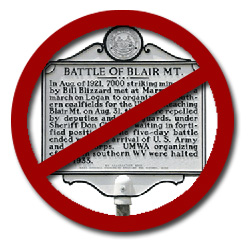 The characters are different but the plot is all too familiar:
The characters are different but the plot is all too familiar:
In the movie Avatar, Parker Selfridge of the RDA mining corporation, has the bulldozers take down the Na’vi history tree. It’s standing between them and a valuable black energy rock called “unobtainium.”
In Appalachia, Randall Reid Smith, WV Commissioner of Culture and History, asks the National Park Service to remove National Historic Register designation from Blair Mountain, site of a major 1921 confrontation between the coal miners unions and the coal industry. On Jan. 8, 2010, Carol Schull, Chief of the National Register for the Park Service, announces an unprecedented de-listing of a national historical site, effective immediately.
Appalachia’s history is standing in the way of another valuable black rock.
“If they can Stalinize our history like this, it shows that big coal still owns our state government,” said Wess Harris, editor of “When Miners March,” a book documenting the union’s side of the battle of Blair Mountain. “This action does not stand alone but is part of a deliberate effort to erase Appalachian history.”
The site of the 1921 armed conflict between over ten thousand coal miners and company guards involved at least 80 deaths. The site has enormous significance for historians and for the American labor movement.
Letters of support for the original historic places listing—approved just last March of 2009—came from the Presidents of the United Mine Workers of America, the Society for Historical Archeology, the Society of American Archeology, and many other historians and scholars.
“The Blair Mountain Battlefield is a unique historic and cultural treasure that deserves all the recognition and protection we can muster,” said archeology professor Harvard Ayers of Appalachian State University. “The coal industry…conducted a scare campaign to con property owners within the nomination boundary into signing formal objections to the listing. “
The decision to de-list Blair Mountain (first reported in a blog post by Jeff Biggers) is questionable on a number of levels, not the least of which is that two of the property owners who supposedly object to the Historical listing are deceased.
In the movie Avatar, the Na’vi of Pandora have intricate language, customs and connections to the natural world that supports them. They are under assault from corporate greed, and one of the first places attacked is their historical memory contained in the Tree of Voices.
Appalachian people have similarly intricate connections to the natural world of Appalachia—connections that they are losing as explosives and giant bulldozers destroy the mountains for coal.
Their history is also under assault.
Its one thing to watch a movie, but it’s another to understand the point that a movie like Avatar is trying to make.
Outside the popcorn palaces, the harsh reality of the struggle over valuable black rock is evident not in distant lands or remote worlds, but very close to home.
AV objects to secrecy of sludge dam safety study
Wednesday, May 27th, 2009 | Posted by The Appalachian Voice | No Comments
Appalachian Voices has filed a Freedom of Information Act request objecting to the secrecy over a new federal study focused on the safety of 15 high-risk sludge dams.
The study, by the federal Office of Surface Mine and Reclamation Enforcement, will be the first to combine elements of dam volume and downstream populations in a risk assessment. Although the engineering work is complete, release of the study is being held up so that coal companies and the state of West Virginia can review it, OSMRE said.
“Given the current state of emergency and severe flooding in West Virginia, we believe that this information has a direct bearing on vital issues of public safety,” Appalachian Voices said in a letter to OSMRE.
“We think that the government should not, indeed cannot in good conscience, wait for the document to be prepared in such a way as to satisfy stakeholders, but rather, that engineering data and draft conclusions must be released to the public immediately.”
Until recently, no federal office had taken a systematic approach to studying the safety of these earthen dams.
A previous FOIA request to the OSMRE this spring by Appalachian Voices revealed that since the late 1990s, the government has studied the safety of only a handful of “randomly selected” sludge dams. Those selected were among the smallest and newest in the region.
Bo Webb’s urgent letter to President Obama is getting picked up by bloggers
Friday, February 20th, 2009 | Posted by The Appalachian Voice | No Comments
These sites have carried Webb’s full letter:
Huffington Post: https://www.huffingtonpost.com/jeff-biggers/urgent-webb-letter-to-oba_b_168604.html
Mountain Journey https://amountainjourney.wordpress.com/2009/02/20/an-open-letter-to-president-obama/
Grist: https://gristmill.grist.org/story/2009/2/19/153153/897
Stop Strip Mining: https://stopstripmining.gnn.tv/blogs/31217/An_Open_Letter_to_President_Obama
GNN TV: https://gnn.tv/threads/34430/An_Open_Letter_to_President_Obama
Alternet: https://www.alternet.org/environment/127877/american_citizens_in_appalachia_are_living_in_a_state_of_terror_/?page=entire

